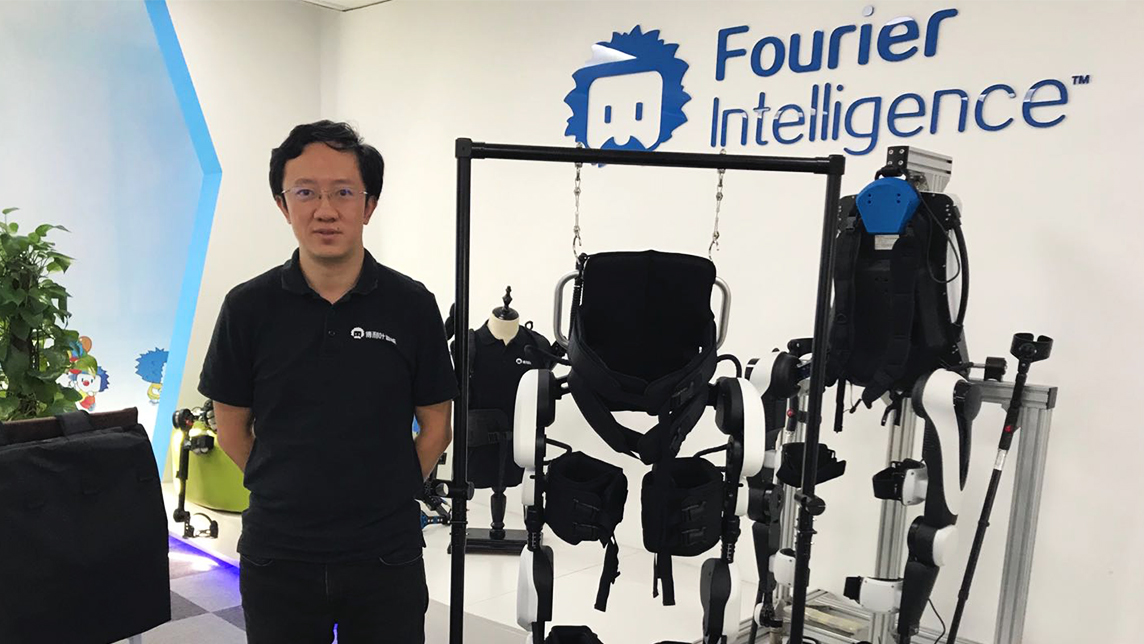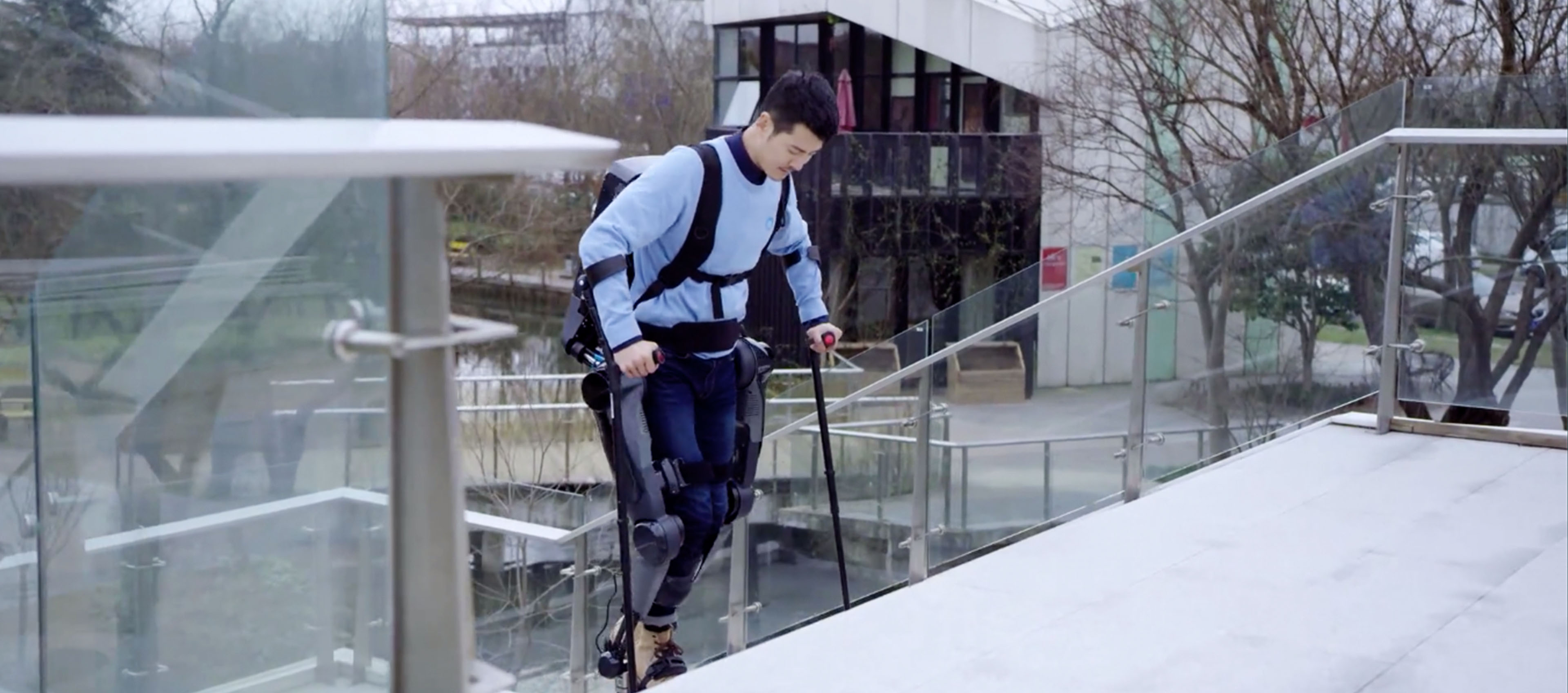Alex Gu is the founder and CEO of Fourier Intelligence, one of China’s first makers of rehabilitation robots and robotic exoskeletons. But a decade ago, even he had no idea what a rehabilitation robot was.
“Until the tragic earthquake of Wenchuan that year [in 2008], few people in China had any notion of rehabilitation, not to mention rehabilitation robots,” he recalled. “Then all of a sudden, a large number of rehabilitation centers were set up across the country.”
That got Gu, a robotics enthusiast since his college days, thinking about creating robots and robotic devices to help in physical rehabilitation and to help the disabled walk again. Right away, he began working in the development of rehabilitation robots in 2009 and founded his first company in the domain three years later. That business got acquired in 2015, and Gu went on to start Fourier Intelligence the same year.
The field of rehabilitation robotics was little known then, explored only by a number of small companies and startups, unlike the more mature internet tech sector that was already dominated by giants like Alibaba and Tencent.
Today, the four-year-old Fourier Intelligence is a pioneer and leader in China’s rehabilitation robotics sector, with its devices used in more than 500 hospitals and rehabilitation centers across the world.
"During the last two decades, only over 1,000 hospitals were using rehabilitation robots," Gu told CompassList in an interview. He expects Fourier Intelligence's robots to continue to attract more buyers, amounting to 1,500–2,000 clients next year.
Therapist shortage, aging population
Rehabilitation robots aren’t new. They were first used three decades ago to help patients with neurological disorders. Their high price tag, however, has prevented the robots from being adopted on a greater scale. For example, Lokomat, a popular lower limb exoskeleton, costs more than RMB 3m in China.
By contrast, Fourier Intelligence’s lower limb equivalent, the X2, retails at one-third of the cost of standard exoskeletons on the market, at RMB 300,000–600,000. Gu said the company was able to achieve such competitive pricing because its lower production costs, thanks to its proprietary technology and strong supply chain systems.
Fourier Intelligence’s growing product line includes four star models: X1 and X2 for lower limb rehabilitation, M1 for joints like wrists and ankles and M2 for upper limbs.
The X2 is its latest model and an update of the X1. Using aluminum and carbon fiber, the X2 is the world’s lightest lower limb exoskeleton. It weighs only 18 kilograms; similar exoskeletons currently available on the market weigh an average of 25 kilos.
Most rehabilitation exoskeletons use predetermined programs to guide user movements. The X2, on the other hand, is equipped with an active motion control system that reads and predicts user movements and responds to the patient just like a human physiotherapist. Although human supervision is still needed, exoskeletons like X2 can greatly reduce the workload of therapists.
Fourier Intelligence’s robots could also fill a vital gap in China, where there are only four therapists for every 100,000 rehabilitation patients. The current shortage of as many as 300,000 physiotherapists will only grow as China’s population grays.
New ways of therapy
The integral parts of a rehabilitation robot – the motion control system, which acts as its brain; sensors, which act as its eyes and skin; and the motor speed reducer, which acts as its muscles and bones – are usually expensive. The team at Fourier Intelligence has cut down the cost of these components by developing the parts themselves. Prior to its recent product rollout, the company had spent two years working on the technology, algorithms and hardware modulars.
Fourier Intelligence also rides on China's strong infrastructure in industrial supply chain to gain lower costs and greater efficiency. Gu added: "We work with OEMs and even have our own factory [in Kunshan, a city neighboring Shanghai and Suzhou] for mass production to bring down our costs." Production is expected to rise to “thousands” of robots over the next two years, he said.
According to the company, rehabilitation could also get more efficient and effective with its "robotic group therapy" solution. Using IoT technology and AI algorithms, its multi-functional robots exchange data and automatically generate customized rehabilitation plans for individual patients receiving group therapy.
"Our multi-device solution has proven to be cost-effective: using our products, one therapist can now supervise three patients at once," said Owen Teoh, Global Head of Sales at Fourier Intelligence.
The system has been deployed in the company’s so-called "smart rehabilitation hubs" at rehabilitation centers and nursing homes in Hangzhou and Shanghai. Another is currently being designed for a rehabilitation center in Dubai.
These hubs consist of the company's full product line - wearable exoskeletons, robots and smaller gadgets - which can aid in the recovery of multiple parts of the human body, e.g., the lower and upper limbs, ankles, wrists and spinal cords.

Consumer users next
Although Fourier Intelligence currently targets only business clients, namely hospitals and rehabilitation centers, Gu says his company is ready to adapt its current robots for the individual home user.
Priced under RMB 100,000, they are not only considerably cheaper than the current models, they will also be lighter and smaller, and with simpler functions so supervision isn’t required when used. "Next, we will further reduce prices through our comparative advantage in supply chain," said Gu.
"We are likely to see a booming market for customized rehabilitation robots for individual use in the coming two years," he continued, citing rising consumer income and health awareness as well as the aging population as the main growth drivers.
But Gu also stressed that Fourier Intelligence will never sacrifice quality. In order to make its products clinically viable, the firm has 20 full-time certified physiotherapists in its team to help design the movements for rehabilitation training. They also ensure the robots can respond to the user’s every movement with the right amount of force or resistance.
Open-source platform EXOPS
In late January 2019, Fourier Intelligence launched the Fourier Exoskeleton & Robotics Open Platform System (EXOPS), developed in collaboration with National Instruments and the University of Melbourne, at the Wearable Robotics Association 2019.
With EXOPS, "researchers don’t have to reinvent the wheel by building exoskeletons from the ground up," said Gu. The first of its kind, this Android-like platform has opened both software and modular hardware, including the Fourier X2, to global creators by providing API, SDK and development support, among other tools.
Since the platform was released, several universities and research institutes have joined the initiative and achieved significant results. Based on EXOPS, a team from Xi’an Jiaotong University has applied their self-developed brain-computer interface technology to X2, enabling the exoskeleton to capture and decode a user's brain signals and then walk based on intent.
"In future, we might bring these derivatives to market, cooperating with the creators in the form of intellectual property licensing or profit sharing," said Gu. "It’s a good thing for both sides."
More importantly, the open-source platform will facilitate the development of the entire industry through the pooling of resources.
Currently, there are no unified standards for rehabilitation robots. This year, Chicago-based Shirley Ryan AbilityLab, the no.1 rehabilitation center in the US according to U.S. News & World Report, invited representatives from 250 institutes around the world to try to find solutions. Fourier Intelligence has acted as AbilityLab's liaison in Asia, coordinating with dozens of hospitals to draft standards. "The draft might be submitted for approval by the International Organization for Standardization at the end of this year," Gu said.
Boosting overseas presence
The only Chinese company to have been granted approvals by food and drug administrations in the US, the EU, Australia and China, Fourier Intelligence has reached cooperation agreements with multiple world-class institutes and hospitals, including the Shirley Ryan AbilityLab, ETH Zürich's Sensory-Motor System Lab, the University of Melbourne, Spain’s Hospital Los Madroños (HLM) and UiTM, the largest public hospital in Malaysia.
Commenting at the signing ceremony for an MoU of cooperation between Fourier Intelligence and HLM, Fourier Intelligence's Chief Strategy Officer Zen Koh said: "This collaboration is strategically important for us. By testing our equipment at HLM, we can get the clinical feedback necessary for iteration of our products."
Fourier Intelligence believes the largely underserved rehabilitation market in Southeast Asia, currently its largest market, has immense potential to grow further. The region has received little attention from big tech firms in the US and Europe. So, the company has made particular efforts to grow its presence in the region. Last year, Fourier Intelligence set up its global hub in Singapore; a Malaysian branch office will be opened before the year is out.
When asked about the biggest challenge to selling its devices overseas, Gu mentioned the "Made in China" stereotype – poorer quality, lower price – tagged to its robots. "We have to get rid of that stereotypical image," he said. "We are doing well with our quality products."













